演员的七力和四感
《入定各阶段的自我感觉》
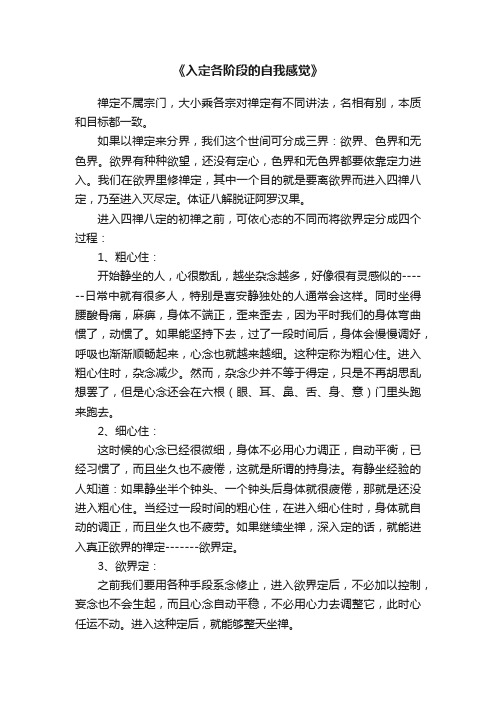
《入定各阶段的自我感觉》禅定不属宗门,大小乘各宗对禅定有不同讲法,名相有别,本质和目标都一致。
如果以禅定来分界,我们这个世间可分成三界:欲界、色界和无色界。
欲界有种种欲望,还没有定心,色界和无色界都要依靠定力进入。
我们在欲界里修禅定,其中一个目的就是要离欲界而进入四禅八定,乃至进入灭尽定。
体证八解脱证阿罗汉果。
进入四禅八定的初禅之前,可依心态的不同而将欲界定分成四个过程:1、粗心住:开始静坐的人,心很散乱,越坐杂念越多,好像很有灵感似的------日常中就有很多人,特别是喜安静独处的人通常会这样。
同时坐得腰酸骨痛,麻痹,身体不端正,歪来歪去,因为平时我们的身体弯曲惯了,动惯了。
如果能坚持下去,过了一段时间后,身体会慢慢调好,呼吸也渐渐顺畅起来,心念也就越来越细。
这种定称为粗心住。
进入粗心住时,杂念减少。
然而,杂念少并不等于得定,只是不再胡思乱想罢了,但是心念还会在六根(眼、耳、鼻、舌、身、意)门里头跑来跑去。
2、细心住:这时候的心念已经很微细,身体不必用心力调正,自动平衡,已经习惯了,而且坐久也不疲倦,这就是所谓的持身法。
有静坐经验的人知道:如果静坐半个钟头、一个钟头后身体就很疲倦,那就是还没进入粗心住。
当经过一段时间的粗心住,在进入细心住时,身体就自动的调正,而且坐久也不疲劳。
如果继续坐禅,深入定的话,就能进入真正欲界的禅定-------欲界定。
3、欲界定:之前我们要用各种手段系念修止,进入欲界定后,不必加以控制,妄念也不会生起,而且心念自动平稳,不必用心力去调整它,此时心任运不动。
进入这种定后,就能够整天坐禅。
以上三种还不能称为得定,只能称为普通的止。
4、未来禅:进入欲界定后,继续修下去,到了某个时候,忽然会有失去身体的感受,感觉到整个身体不见掉。
这种感受是在静坐时发生的,而不是打开眼睛来看。
有了这种感受之后,身体就不会因失调而生病,四大和谐。
因此,一个坐禅的人,若要身体没病,至少要达到这一步,即是得定。
表演七力四感训练内容
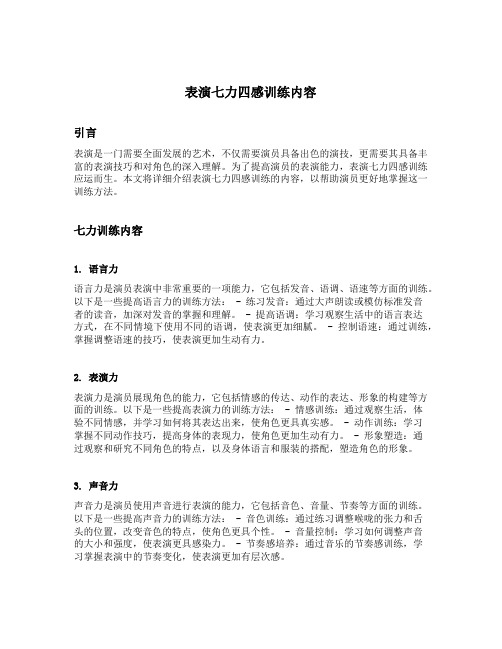
表演七力四感训练内容引言表演是一门需要全面发展的艺术,不仅需要演员具备出色的演技,更需要其具备丰富的表演技巧和对角色的深入理解。
为了提高演员的表演能力,表演七力四感训练应运而生。
本文将详细介绍表演七力四感训练的内容,以帮助演员更好地掌握这一训练方法。
七力训练内容1. 语言力语言力是演员表演中非常重要的一项能力,它包括发音、语调、语速等方面的训练。
以下是一些提高语言力的训练方法: - 练习发音:通过大声朗读或模仿标准发音者的读音,加深对发音的掌握和理解。
- 提高语调:学习观察生活中的语言表达方式,在不同情境下使用不同的语调,使表演更加细腻。
- 控制语速:通过训练,掌握调整语速的技巧,使表演更加生动有力。
2. 表演力表演力是演员展现角色的能力,它包括情感的传达、动作的表达、形象的构建等方面的训练。
以下是一些提高表演力的训练方法: - 情感训练:通过观察生活,体验不同情感,并学习如何将其表达出来,使角色更具真实感。
- 动作训练:学习掌握不同动作技巧,提高身体的表现力,使角色更加生动有力。
- 形象塑造:通过观察和研究不同角色的特点,以及身体语言和服装的搭配,塑造角色的形象。
3. 声音力声音力是演员使用声音进行表演的能力,它包括音色、音量、节奏等方面的训练。
以下是一些提高声音力的训练方法: - 音色训练:通过练习调整喉咙的张力和舌头的位置,改变音色的特点,使角色更具个性。
- 音量控制:学习如何调整声音的大小和强度,使表演更具感染力。
- 节奏感培养:通过音乐的节奏感训练,学习掌握表演中的节奏变化,使表演更加有层次感。
四感训练内容1. 视觉感视觉感是演员对于舞台和角色的视觉理解能力,它包括服装搭配、舞台布置等方面的训练。
以下是一些提高视觉感的训练方法: - 观察练习:学习观察不同风格的服装和舞台布置,了解它们所传递的信息和意义。
- 形象设计:通过学习服装和化妆的技巧,设计与角色相符合的形象,使表演更加真实。
表演七力四感训练内容
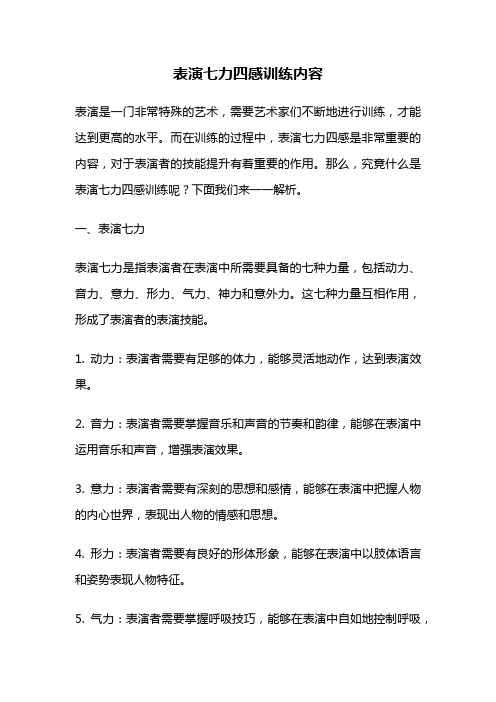
表演七力四感训练内容表演是一门非常特殊的艺术,需要艺术家们不断地进行训练,才能达到更高的水平。
而在训练的过程中,表演七力四感是非常重要的内容,对于表演者的技能提升有着重要的作用。
那么,究竟什么是表演七力四感训练呢?下面我们来一一解析。
一、表演七力表演七力是指表演者在表演中所需要具备的七种力量,包括动力、音力、意力、形力、气力、神力和意外力。
这七种力量互相作用,形成了表演者的表演技能。
1. 动力:表演者需要有足够的体力,能够灵活地动作,达到表演效果。
2. 音力:表演者需要掌握音乐和声音的节奏和韵律,能够在表演中运用音乐和声音,增强表演效果。
3. 意力:表演者需要有深刻的思想和感情,能够在表演中把握人物的内心世界,表现出人物的情感和思想。
4. 形力:表演者需要有良好的形体形象,能够在表演中以肢体语言和姿势表现人物特征。
5. 气力:表演者需要掌握呼吸技巧,能够在表演中自如地控制呼吸,达到表演效果。
6. 神力:表演者需要有良好的心理素质,能够在表演中保持冷静,控制情绪,达到表演效果。
7. 意外力:表演者需要具备突发事件处理的能力,能够在表演中应对各种意外情况,保证表演的顺利进行。
二、表演四感表演四感是指表演者在表演中需要具备的四种感觉,包括听觉、视觉、触觉和嗅觉。
这四种感觉在表演中起着非常重要的作用,能够帮助表演者更好地表现人物和场景。
1. 听觉:表演者需要通过听觉感受到音乐和声音,掌握音乐和声音的节奏和韵律,达到表演效果。
2. 视觉:表演者需要通过视觉感受到人物和场景的形象和特征,掌握肢体语言和姿态,达到表演效果。
3. 触觉:表演者需要通过触觉感受到人物和场景的质感和温度,掌握道具和服装的使用,达到表演效果。
4. 嗅觉:表演者需要通过嗅觉感受到人物和场景的气味和味道,掌握情境和环境的氛围,达到表演效果。
三、表演七力四感训练内容要想让自己成为一名优秀的表演者,就需要进行表演七力四感的训练。
下面是一些常见的训练内容。
七力四感
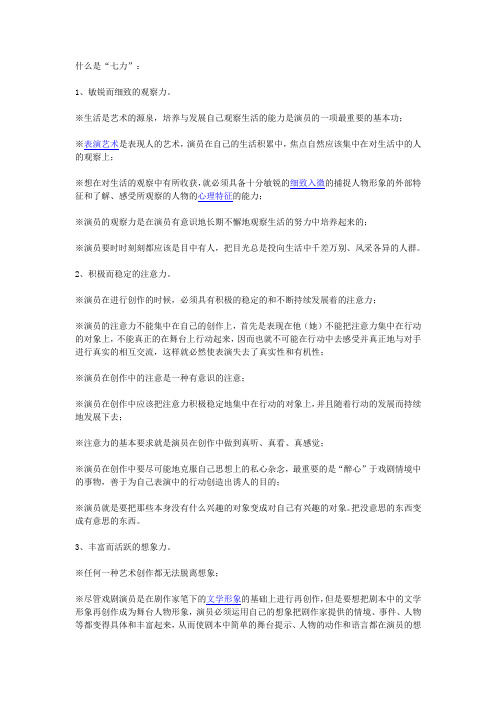
什么是“七力”:1、敏锐而细致的观察力。
※生活是艺术的源泉,培养与发展自己观察生活的能力是演员的一项最重要的基本功;※表演艺术是表现人的艺术,演员在自己的生活积累中,焦点自然应该集中在对生活中的人的观察上;※想在对生活的观察中有所收获,就必须具备十分敏锐的细致入微的捕捉人物形象的外部特征和了解、感受所观察的人物的心理特征的能力;※演员的观察力是在演员有意识地长期不懈地观察生活的努力中培养起来的;※演员要时时刻刻都应该是目中有人,把目光总是投向生活中千差万别、风采各异的人群。
2、积极而稳定的注意力。
※演员在进行创作的时候,必须具有积极的稳定的和不断持续发展着的注意力;※演员的注意力不能集中在自己的创作上,首先是表现在他(她)不能把注意力集中在行动的对象上,不能真正的在舞台上行动起来,因而也就不可能在行动中去感受并真正地与对手进行真实的相互交流,这样就必然使表演失去了真实性和有机性;※演员在创作中的注意是一种有意识的注意;※演员在创作中应该把注意力积极稳定地集中在行动的对象上,并且随着行动的发展而持续地发展下去;※注意力的基本要求就是演员在创作中做到真听、真看、真感觉;※演员在创作中要尽可能地克服自己思想上的私心杂念,最重要的是“醉心”于戏剧情境中的事物,善于为自己表演中的行动创造出诱人的目的;※演员就是要把那些本身没有什么兴趣的对象变成对自己有兴趣的对象。
把没意思的东西变成有意思的东西。
3、丰富而活跃的想象力。
※任何一种艺术创作都无法脱离想象;※尽管戏剧演员是在剧作家笔下的文学形象的基础上进行再创作,但是要想把剧本中的文学形象再创作成为舞台人物形象,演员必须运用自己的想象把剧作家提供的情境、事件、人物等都变得具体和丰富起来,从而使剧本中简单的舞台提示、人物的动作和语言都在演员的想象力的帮助下得到充实和深化;※想象在演员的创作中不仅起着对剧作的补充与深化的作用,还能促使演员产生情绪体验以及动作的欲求;※演员的想象力应该具有强烈的行动性;※演员的想象中还应该有一种在创作过程中出现的即兴想象,如果演员不想在每次的创作中去机械地重复前一次的创作的话,这就需要与同演者进行合作时,在接受对方所给予刺激的同时,能够出现一种即兴的想象,进一步丰富和改进自己的创作;※想象力不是天生的,它的培养与发展是和演员的生活积累与文学、艺术修养分不开的。
演员的七力和四感
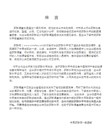
演员的总体素质,从某种意义上说与从事其他各种形式的艺术创造的艺术家有十分相似之处。那么,从事表演艺术专业的演员在其专业素质上是否有特殊要求呢?
有人说,任何人都可以成为一个演员。这种观点在一定程度上有正确的一面,因为任何人,包括残疾人在内,都具有可能成为一个演员的最基本的条件。在戏剧演出中,特别是在电影与电视剧的创作中,都曾经有业余演员参与,而且有的业余演员也曾创造出十分光彩的人物形象。但是,这绝不意味着成为一个专业的演员无需具备从事表演艺术这一专业所特有的素质。恰恰相反,对于一个演员在专业素质上的要求,比对从事任何其他职业的人的要求要严格得多。或者可以说,一个不具备演员应有的创作素质的人,是不可能从事表演艺术的创造的。
从心理学和生理学的角度来看,所谓演员的创作素质,实际上就是要求演员在心理、生理上能够适应表演艺术所提出的创作任务和表演艺术所具有的特点。斯坦尼斯拉夫斯基所说的演员创作的有机天性,从实质上说就是演员在创作时所应该具备的心理和形体素质。我们所说的演员的创作素质,就是指演员能够适应表演艺术创作需要的内部心理素质和外部形体(包括声音)可塑力这样一些专业素质。那么,一个专业演员究竟应该具备什么样的创作素质呢?
演员在创作中的注意是一种有意识的注意。也就是说在创作中应该把自己的注意力积极、稳定地集中在行动的对象上,并且随着行动的发展而持续不断地发展下去。这种注意力的最基本的要求就是演员在创作中应该能够做到真听、真看、真感觉。一个具有良好的创作素质的演员,应该在他(她)进行创作时十分迅速地把注意力集中到创作上来,并且下意识地做到真听、真看、真感觉。而要做到这一点,演员除了在创作中尽可能地克服自己思想上的私心杂念之外,最重要的是“醉心”于戏剧情境中的事物,善于为自己表演中的行动创造出诱人的目的。抓住了这一关键,演员在培养与发展自身素质时,就要从强制自己在创作的环境中做到真听、真看、真感觉开始,逐渐地使之成为演员本人创作天性的一部分。 Leabharlann 5准确而又合理的判断与思考力
七力四感名词解释

七力四感名词解释
所谓七力四感是指七种力量和四种感知能力,具体解释如下:
七力:
1. 身体力量:指身体素质和力量,包括肌肉力量、耐力、敏捷性等。
2. 精神力量:指思维和意志力的强大,包括决心、毅力、专注力等。
3. 弹性力量:指适应环境变化和压力的能力,包括灵活性、适应性和应变能力等。
4. 情感力量:指情绪的掌控和管理能力,包括情绪稳定、情绪调节和情绪表达等。
5. 创造力量:指创新和创造的能力,包括想象力、创意思维和问题解决能力等。
6. 人际力量:指与他人建立关系和沟通的能力,包括合作、领导和心理洞察力等。
7. 精细力量:指细致和精确的能力,包括观察细节、精确执行和精确思维等。
四感:
1. 视觉感知:通过眼睛感知周围环境和物体的能力。
2. 听觉感知:通过耳朵感知声音和声波的能力。
3. 触觉感知:通过皮肤和触觉器官感知物体的触感和温度的能力。
4. 直觉感知:通过直觉感知来自内心和直觉的信息的能力。
京剧生角基本动作
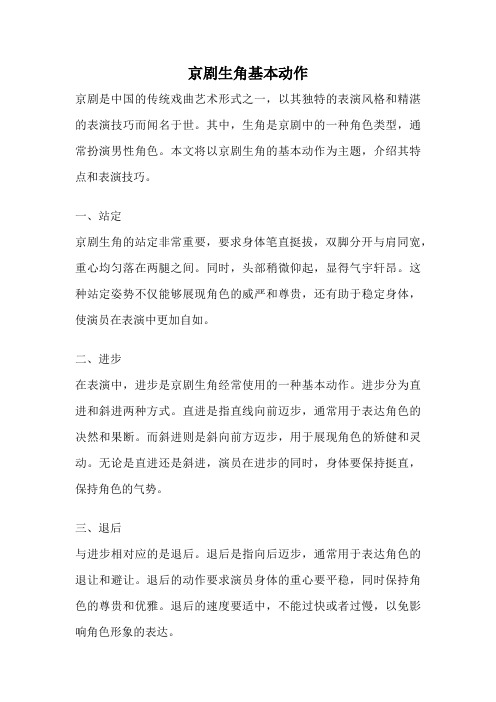
京剧生角基本动作京剧是中国的传统戏曲艺术形式之一,以其独特的表演风格和精湛的表演技巧而闻名于世。
其中,生角是京剧中的一种角色类型,通常扮演男性角色。
本文将以京剧生角的基本动作为主题,介绍其特点和表演技巧。
一、站定京剧生角的站定非常重要,要求身体笔直挺拔,双脚分开与肩同宽,重心均匀落在两腿之间。
同时,头部稍微仰起,显得气宇轩昂。
这种站定姿势不仅能够展现角色的威严和尊贵,还有助于稳定身体,使演员在表演中更加自如。
二、进步在表演中,进步是京剧生角经常使用的一种基本动作。
进步分为直进和斜进两种方式。
直进是指直线向前迈步,通常用于表达角色的决然和果断。
而斜进则是斜向前方迈步,用于展现角色的矫健和灵动。
无论是直进还是斜进,演员在进步的同时,身体要保持挺直,保持角色的气势。
三、退后与进步相对应的是退后。
退后是指向后迈步,通常用于表达角色的退让和避让。
退后的动作要求演员身体的重心要平稳,同时保持角色的尊贵和优雅。
退后的速度要适中,不能过快或者过慢,以免影响角色形象的表达。
四、转身转身是京剧生角经常运用的一种动作,可以表达角色的转折和转变。
转身分为左转和右转两种方式。
转身时,演员的动作要流畅自然,同时保持身体的平衡。
转身的速度要适度,不可过快或者过慢,以免影响角色形象的表现。
五、抱拳抱拳是京剧生角常用的手势动作,用于表达角色的决心和坚定。
抱拳的动作要求演员双手合拢,手背朝上,两手贴合,手指微微弯曲。
抱拳时,演员的手臂要保持挺直,肩部要放松自然。
抱拳的力度要适中,既要显得有力,又要保持优雅。
六、挥手挥手是京剧生角常用的手势动作,用于表达角色的欢迎和送别。
挥手的动作要求演员手臂自然下垂,手掌微微向内,手指微微弯曲。
挥手时,演员的动作要流畅自然,力度要适中,不可过于夸张或者过于生硬。
七、腿法腿法是京剧生角表演中的重要组成部分,用于表达角色的力量和动感。
腿法包括扑腿、踢腿、劈腿等多种动作。
在表演中,腿法要求演员腿部力量充沛,动作要准确矫健。
演员的七力和四感(Sevenpowersandfoursensesofanactor)
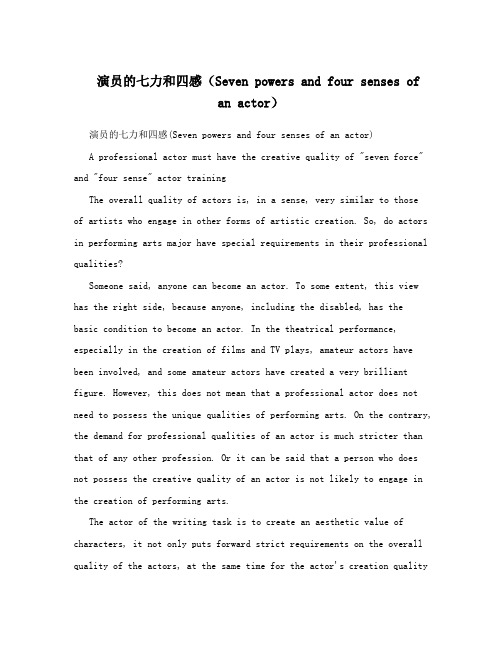
演员的七力和四感(Seven powers and four senses ofan actor)演员的七力和四感(Seven powers and four senses of an actor)A professional actor must have the creative quality of "seven force" and "four sense" actor trainingThe overall quality of actors is, in a sense, very similar to thoseof artists who engage in other forms of artistic creation. So, do actors in performing arts major have special requirements in their professional qualities?Someone said, anyone can become an actor. To some extent, this view has the right side, because anyone, including the disabled, has thebasic condition to become an actor. In the theatrical performance, especially in the creation of films and TV plays, amateur actors have been involved, and some amateur actors have created a very brilliant figure. However, this does not mean that a professional actor does not need to possess the unique qualities of performing arts. On the contrary, the demand for professional qualities of an actor is much stricter than that of any other profession. Or it can be said that a person who does not possess the creative quality of an actor is not likely to engage in the creation of performing arts.The actor of the writing task is to create an aesthetic value of characters, it not only puts forward strict requirements on the overall quality of the actors, at the same time for the actor's creation qualityalso has special requirements. On the other hand, the characteristics of performing arts also put forward special requirements for the creative quality of actors. The performance requires the actor "Avatar" in the end, which makes the actor not only the creator, but also the material and tool of creation, as well as the created works of Art -- the image of the characters. In addition, actors are created in hypothetical and artistic situations. These characteristics will inevitably require actors to have some special ability in the creation to adapt to the needs of creation.From the angle of psychology and physiology, the actor's creation quality, is actually requires actors to adapt to the characteristics of the performing arts and performing arts creation task is in the psychological and physiological. The organic nature of the actor's creation by Stanislavski is essentially the psychological and physical qualities that an actor should possess in his writing. The quality of the actor's creation refers to some professional qualities that the actor can adapt to the inner psychological quality of the performing art and the plastic force of the external form (including sound). So, what kind of creative qualities should a professional actor possess?Professor Wang Shuyan thinks, generally speaking, in order to become a competent actor, at least should have "seven force" and "four sense""What is "seven forces"?1. keen and meticulous observationPerformance art can not leave the source of life. Therefore, the ability to develop and develop their own ability to observe life is one of the most important basic skills of an actor. In the observation of life, especially for human observation is particularly important. Because performing art is the art ofshowing people, the focus of the actor should focus on the observation of the people in his life. If an actor wants to gain something in the observation of life, he must have a keen and nuanced grasp of the external features of the characters and the ability to understand and feel the psychological characteristics of the observed characters.Performing art is the art of showing people. The accumulation of an actor's life can not be focused on the observation and research of human beings. Of course, because people always and he (she) of the era, society inextricably linked, so the actor will inevitably have to research and analysis of the era and society during the observation and study of people at the same time, especially for the people affected, and gradually deep into people's hearts, understanding and experience of different people thoughts, desires, emotions and so on. Only in this way can the actors create the "spiritual life" of the people when they use these life materials to create.But this does not mean that the observation of the external features of the characters is insignificant. On the contrary, because the inner world is not visible, so for the inner world of human understanding isoften from the outside to the inside, from outside to inside. People dress, speech and deportment, voice and expression and behavior is a reflection of people's inner world, so the external characteristics of the observation, understanding, can be said to be a bridge to the inner world of people, is also part of an actor in the creation of a unified internal and external characters are.The actor has a remarkable feature in his life observation,especially in the observation of the characters, that is, it is closely related to imitation. That is to say, an actor often imitates his own characters by imitation, and finally stores them in his own memory. However, it is impossible for an actor to imitate himself without imitation and subjective attitude because of the imitation of the actor. In this sense, it should be a kind of "simulation"".This observation of actors is cultivated in the efforts of an actor to consciously and persistently observe life. It requires the actors should always be in the eyes of the people, always looking at life in different ways, different styles of people. Some actors often cannot do this, they always want to show off their defiant, results in contact with people, not only can not observe others, instead of becoming the object of discussion and observation.2. positive and steady attentionActors must have positive, stable and continuous attention when they are creating. In life, people or consciously pay attention to an object, or unconsciously attracted by an object in the past. In fact, people arevery naturally aware of everything happening around them and focus on where they should concentrate. However, when an actor performs a performance, the situation is different. When an actor performs a performance, he or she performs publicly in front of the audience. The opposite is sitting with his eyes fixed on his or her audience. They tend to be more or less concerned with the actor's attention. These factors, coupled with some reason on the actor in a person's life, such as an actor or actress because ofselfish ideas and personal considerations, met what unpleasant things, tend to make the actors to focus on performance creation, therefore, will inevitably affect the actor's creation. The actor can't concentrate on their own creation, the first performance in he (she)can't focus on the action of the object, not really in the arena of action, so it is impossible to feel in action and really rival real mutual communication, it will inevitably make the performance lost authenticity and organic. In the first year of teaching in some theatre and film schools at home and abroad, some teachers even take one hour to concentrate their attention on each class. It can be seen that in the performance creation, positive and steady attention is very importantfor an actor.The attention of actors in creation is a conscious attention. Thatis to say, in the creation, we should focus our attention on the object of action actively and steadily, and continue to develop with the development of action. The basic requirement of this attention is thatthe actors should be able to hear, see and feel in their creations. An actor who has a good creative quality should focus his attention on writing when he or she is writing, and consciously listen, see and feel consciously. To do this, in addition to the actors in the creation of as much as possible to overcome his thoughts on the most important thing is selfish ideas and personal considerations, "obsessed" in the theater in the context of things,Good at the performance of their own actions to create attractive purposes. Seize the key actors, to develop their quality in training, to force yourself to do it from listening, watching, feeling really really began in the creation of theenvironment, gradually become part of the creative nature of the actor himself.3 rich and active imaginationThe waves of any kind of artistic creation cannot do without imagination, actor's creative nature is so. Although the actor is the foundation created in the literary image of the playwright to create, but to put the script of the literary image creation become characters, the actors must use their imagination to play the authors provide situations, events and characters have become specific and rich, so that the stage of simple script prompt, action figures and language are enriched and deepened in the actor's imagination help. Otherwise the actor do not talk is a creator, writer that is at most a megaphone. Therefore, imagination becomes an indispensable part of an actor'screative quality, and it can be said to be a very important part. The actor's imagination in the performing arts has the same side with the imagination of other artists, which means, first of all, to see what we are imagining with our inner vision". For the actors, this imagination not only plays a role in the supplement and deepening of the drama, but also enables the actors to produce emotional experience and desire for action. On the other hand, the imagination of an actor has its own characteristics, that is, it should have a strong action. Because the foundation of performing art is action, the imagination of an actor can not just stay in the static description, although this staticdescription is sometimes necessary. He (she) is in need of more specific and vivid, can vividly imagine the characters unique mind - body movements, namely in the character's inner desire to promote the action process of mental activities and reflect the physical and psychological process of the language movement. Only with such strong action imagination can the actor move himself into acting.In addition, the actor's imagination should also have a kind of improvisation imagination in the process of creation. If an actordoesn't want to at every time in the creation of the mechanical repetition of previous works, he (she) will need to cooperate in the same play, in an opponent to stimulation at the same time, can appear a kind of impromptu imagination, to further enrich and improve their own creation, make every creation is more vivid.The imagination of the actors also includes fantasy, and there is a saying in Chinese Opera Art: "there are, there are; there are, there are no, there are also."." In addition to reflecting real-life works, there are a large number of works of mythology, fairy tales and sciencefiction dramas. In the performance of these different genres, the actor should fully play the rich and colorful fantasy to stimulate and promote their own creation.Imagination is not innate, it can be developed by training. The cultivation and development of the imagination of an actor (including fantasy) is inseparable from the accumulation of an actor's life and his literary and artistic accomplishments. The extensive knowledge of life and the enrichment of literature and art are the basis for the rich and active imagination of an actor. "Read ten thousand books, walk ten thousand miles", you will provide the necessary material for your imagination.In addition, actors should also actively train their imagination. In fact, imagination is, in a sense, reorganizing and processing the experience accumulated in what we see and what we have experienced in the past. For example: in the process of observing life, according to the observations, according to their own experience, give full play to their imagination, to observe people and things become a story, and as far as possible to objectify and in details. Repeated exercise may increase the imagination of an actor. In the process of performance creation,The actor can use "magic if" to mobilize his imagination, to supplement and deepen the author's cue, and to make imagination develop according to its logic.4 keen and sincere sensibilityIn life, when people accept the stimulation of external things,there will always be some kind of feeling and lead to the corresponding emotional changes, we call this ability as sensibility. In theperforming arts, one important aspect is to create the emotional experience of the characters, and the actor's sensibility is the most important guarantee to create the emotional experience of the characters. Due to the performance of artistic creation, the actor accepted is not like that in real life exciting, but a fictional art, plus some of the factors on the creation of interference in the environment, some actors often do not feel what to give objective stimuli, so it cannot create a character's emotional experience. Such actors can not really be tempted and excitedin the performance, and the results can only be spurious "performance emotion" to stall. People often talk about the existence of false flaws in the performance, and the performance of the false is mainly because the actors in the creation of characters, lack of real experience. Why can't some actors really experience it? In addition to the reasons for creative techniques and techniques, one of the most important reasons is the lack of keen and sincere sensibility that an actor should possess.The sensibility that an actor should possess is an ability to feel the stimuli of an objective thing in the context of artistic fiction. A good quality actor, should be very sharp, very sincere to feel the story provided by events and facts of the impact of scenery and lighting to create atmosphere, show the opponent, a word or two every act and every move or even a subtle eyes, sighed and gave stimulation. To trigger the appropriate emotional experience.The overall quality of training and experience of the actor actor creation quality has a certain contact. Generally speaking, life is sincere, passionate, full of love for life, love and hate have adistinct person, in the creation of the sensibility than those of hypocrisy, indifference, no enthusiasm for life, for the better completely indifferent happening around people more. Indifferent people in the rehearsal field, generally in life also tends to be very cold, the people in the creation as it is difficult to say so "on the fire". Therefore, in order to enhance and develop their own feelings, actors should first try their best to make themselves less hypocritical, more sincere, and always full of enthusiasmfor life.On the other hand, the enhancement of the sensibility of the actors is closely related to the all-round development of the creative quality of the actors. For example, the cultivation of attention, imagination, sincere belief and sense of reality can enhance and develop the sensibility. The sensibility of the actor in the creation is actually anintegral part of the actor's organic creative nature, or a link in the chain of the actor's creative psychological activity. Therefore, actors must pay attention to develop their own feelings in the process of all-round development and development of their own creative quality.5 accurate and reasonable judgment and thinking abilityIn performing art creation, another important link in the actor's creative psychological activity is judgment. Judgment, to a considerable extent, is to think, so whether the actor has judgment, in a sense, is the actor in the performance of the ability to think.Many actors feel that it is not easy to think and judge in a performance like in life. Why does this happen?In the performance creation, the situation is a kind of artistic fiction, and the outcome of the events in the plot has been scheduled, unlike in life, it must be by people thinking and judgment to make a decision,So some actors go straight to the end without thinking, and some actors don't judge and think because they don't have the ability to judge and think in the performance. Whatever the reason, the result is that the process of the psychological activities of the characters has lost its due links, so it is impossible to achieve the reality of the performance. Especially in the huge psychological conflict to show some characters of the place, if the actor does not have judgment andthinking in the show, he (she) can only pretend and pretentious, such aresult would not be able to create the characters inner real life, only to make him (her) characters become feeble, very false.The ability of judgment and thinking of the actors is to ask the actor can in the fictional context can also like in life on the show, "here", true, impromptu to judgment and thinking, with performances of the idiom is "really thinking", it should become a part of the actor writing in nature.6 sensitive and delicate adaptabilityIn performing arts, actors always show their inner feelings and moods as vividly as possible by means of adaptation. Therefore, adaptation is a powerful means to reflect and reveal the characters' thoughts and emotions". In life, people often say what "you have to say, I have to speak", "adjust to the occasion", in which "go to the language" and "strain" is a kind of adaptation. In the show there is a adaptation problem, that is the actor always want to adapt to the situation to show their stimulation for stimulation, and the sensitive and delicate adaptation to show people's thoughts and feelings.Sensitive and delicate adaptation of actors, in performance canoften create the very accurate, bright, delicate and colorful, which created the character vivid touching; and a lack of this ability will be the same actors often in the show, created by the people is not very clear and vivid, can only make the audience feel boring.The adaptation of the actor in the performance is based on the understanding and perception of the prescribed situation and theaccurate understanding of the relationship between the characters andthe characters. From the point of view of the creative quality of actors, to a certain extent, it is the comprehensive performance of actors' creative quality. We sometimes hear people praise an actor "spirit", which is often because the actor has a very sensitive, very delicate improvisation ability when performing. This adaptation ability not only and actor's life experience, ideological cultivation, cultural andartistic accomplishment, but also with an actor's attention, imagination, perception, judgment and expressive force and so on are closely linked, because a good ability to adapt is built on the basis of these capabilities of the.7 vivid form and expressive force of languageThe ideal state that an actor pursues when creating a character isnot only a sincere, deep and delicate inner experience, but also an accurate, vivid and vivid external expression. Only in this way, the actor created characters, is to be the same outside and inside unity, harmony and unity. Because acting as a kind of art, its purpose is notto indulge in the enjoyment of actor self experience, but to the character's experiences to show up in front of the audience, the audience is infected,even by the shock, so as to guide the audience for your character understanding, sentiment, and thought. Chinese opera performing artists pay great attention to the expressive force, they think only "appearance" can be "God open", "accommodate" and see "God with"". Thisshows that only through the external performance, the actor's inner experience is visible, can appeal to the audience, perceived by the audience.Man is an organic whole, the external form, voice and language ofhis (her),It's impossible not to influence his or her inner feelings. Justlike a curled body, people often experience a depressive emotion, and the spasm of muscle often leads to the feeling of mental tension. Therefore, the change in the attitude of the actor on the show,inflection of sound level, strength, rigid and intonation, often can cause the corresponding changes of inner feelings. It can also be seen that expressive force is a very important part of the actor's creative quality.Actors in the performance to show their own inner experience means, mainly his (her) body, voice and language. Therefore, body, voice and language are also called the two pillars when actors create characters.A good creative qualities of actor, should be through continuous training, make their body, voice and language has sufficient plasticity to achieve "natural perfection", as Stanislavski said, "to adapt to the nature of his allotted work", or as Poland famous theater director Gro Torfs Ki said. The actor's embodied organ, should be like an elastic film, when the feelings of the atmosphere filled into the film's pocket, it will naturally come with emotionalchanges and expansion.There is a very wrong point of view, that as long as there is a sincere experience, it will naturally reveal, not in the form and language too much effort. The mistake of this view is that it not only ignores the importance of the external manifestation, but also denies the nature of the performance that acting should be as an art. In the performance, the real, delicate, delicate emotional experience, if there is no expression of the embodiment of organs, it is impossible to fully reflect. The subtleties of Chopin is not expressed in the big horn, we also may use the form, material to reflect those organs of the rough part, to express the subtle unconscious emotions, especially when no tuning reflects organs like the musical instrument played out of tune. Can not be used without training bodies to express the internal process of the spiritual life of the people the most meticulous, can not be used as instruments to play out of tune some of Beethoven's "Ninth Symphony". Even very seriously and experience Stanislavski also denied that as long as the experience emphasizes, will naturally reflect the views, but that the actor must have the form trained with regularity and material of organs, it is possible to have sincere, delicate, subtle feelings correctly and vividly reflected. What's more, acting as an art, actors can show their inner emotional experience without considering the beauty that should be enjoyed by the audience.So Mr on body shape performance saying: "I think there are threevery important things, a look, a gesture, a gait. These three aspects often reflect the character of the external characterof the characters." In a gesture, painting, portrait painting is to draw the eyes in addition to good players, the best performance of hand character. Luo Dan Museum has two hands, molded in a small gypsum holder, entitled "love". They are men's hands and women's hands, in love hands, but not as common as love. The image of the two hands is amazing, andthe feelings of the two hands are too rich. Eye, gesture and gait are important to portray characters. In addition to the expressive power of the form, the expressive force of language also plays an important role in shaping characters. The rich inner experience of the characters canbe revealed through the changes of the tone, intonation and mood of the lines that the actors read.Actors' shape, voice and language performance depend on the actors' long and hard exercise, and it is possible to develop. There is no shortcut in this respect. China opera artists stressed that actorsshould be "winter training 39 day summer training",Only in this way can get an excellent effort. For film andtelevision actors, the only way to improve the quality of their performance is to practice hard.So what does "four senses" mean?1 sense of realitySince the performance of actors is always in a fictional situation, the actors should have sincere faith and moderate sense of reality.2 sense of imageBecause actors need to create a variety of characters, different characters, so the actor should have a good grasp of the characteristics of the image of the image.3 sense of humorBecause actors inevitably want to play comedy, or always inevitably encounter comedy situations in different scripts, so the actors should have a sense of humor.4 sense of rhythmThe performance of "Ping", "Wen", "drag", will give the audience a feeling of lethargy. Therefore, actors should also have the rhythm needed to adapt to the development of action.In addition, actors have different styles and genres of the script show, must have a sense of style, in the creation of a figure to have the overall sense, as well as the overall quality of the actor should have aesthetic sense.The most basic creative quality, must contain the talent factor, it exists in each person, is only how many, strong and weak difference. In order to meet the needs of performing art creation, these qualities should become the creative nature of actors. Therefore, actors must try to cultivate and develop. Even those who have good talent can not ignore this exercise.。
戏剧概论重点笔记
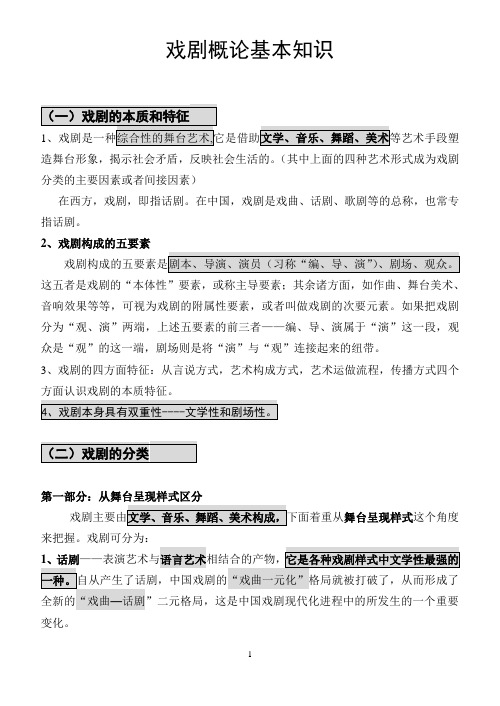
戏剧概论基本知识造舞台形象,揭示社会矛盾,反映社会生活的。
(其中上面的四种艺术形式成为戏剧分类的主要因素或者间接因素)在西方,戏剧,即指话剧。
在中国,戏剧是戏曲、话剧、歌剧等的总称,也常专指话剧。
2、戏剧构成的五要素这五者是戏剧的“本体性”要素,或称主导要素;其余诸方面,如作曲、舞台美术、音响效果等等,可视为戏剧的附属性要素,或者叫做戏剧的次要元素。
如果把戏剧分为“观、演”两端,上述五要素的前三者——编、导、演属于“演”这一段,观众是“观”的这一端,剧场则是将“演”与“观”连接起来的纽带。
3、戏剧的四方面特征:从言说方式,艺术构成方式,艺术运做流程,传播方式四个方面认识戏剧的本质特征。
第一部分:从舞台呈现样式区分舞台呈现样式这个角度来把握。
戏剧可分为:——表演艺术与语言艺术相结合的产物,变化。
2、歌剧——表演艺术与音乐艺术相结合的产物,以技巧性的美声为主要表演手段,音乐具有决定性的地位。
注意:34、,肢体语言来表现剧本。
)戏曲——表演艺术与多种因素的结合,是中国民族特色的戏剧,具有写意化、程式化、自由化等高度的综合性。
第二部分:从剧情构成内容三要素不同区分1、情节、性格、思想这三者成为构成戏剧作品内容的三大要素,因其在剧中的所占比重不同,便造成了不同的戏剧类型。
2、传奇剧、通俗剧、佳够剧。
此类剧以骑着离奇的情节取胜。
3、问题剧、政治剧、理念剧:都是重思想轻情节与性格。
问题剧:易卜生的四大问题剧:《社会支柱》、《玩偶之家》、《群鬼》、《人民公敌》政治剧:三江好》、《最后一计》)和《放下你的鞭子》4、性格剧和心理剧:分别一情节或思想作为剧情构成的重心。
像一些莎士比亚的悲剧和喜剧第三部分:从题材选择的不同区分1含“革命历史剧”)三个特征:历史的真实性、具有历史主义精神、对当代现实生活的启示性。
以历史事件和历史人物再现在舞台上。
2):以真人真事为题材,不能虚构。
两类:以人物事迹为描述对象的传记性纪实剧和事件过程为描述对象的报道性纪实剧。
董超

董超一、《水浒传》人物董超是长篇小说《水浒传》中的人物。
原为东京开封府押送公人。
曾和薛霸一起押送林冲去沧州,受高太尉指使在途中野猪林陷害林冲。
幸有花和尚鲁智深保护,林冲才安全到达沧州。
回开封府后被高太尉寻事刺配北京大名府,大名府梁中书因其能干而把他留用府内。
后来董超又和薛霸一起押送梁山好汉卢俊义去沙门岛,李固送与50两银子让二人在途中结果卢俊义。
结果二人在下手时被卢俊义的仆人燕青杀掉。
二、汉末三国时期武将董超(?-219),东汉末年曹操部将,为庞德手下部曲将。
历史传记庞德之部曲将。
建安二十四年(219),庞德于樊城被关羽水攻所败,董超与将军董衡欲降关羽,被庞德收斩。
演义传记魏国领军将校,于禁七军的统帅之一。
建安二十四年(219),水淹七军时劝庞德投降,被杀。
三、少将董超(1915-1990),山东省新泰市(原山东省新泰县)人。
一九三七年加入中国共产党。
一九三八年参加徂徕山起义。
抗日战争时期,任新泰县抗日游击队队长,山东人民抗日救国军第四支队一团连政治指导员,八路军山东纵队第四支队特务大队副政治教导员、政治处主任,鲁中军区第十一团政治委员。
解放战争时期,任鲁中军区警备第二旅政治部主任,第九师政治部主任,华东野战军第八纵队二十三师政治部主任,师政治委员。
中华人民共和国成立后,任鲁中南军区政治部主任,中国人民解放军军事学院政治系班主任、系主任,军事学院基本系政治委员、高级系政治委员,军事学院政治部主任,军政大学副政治委员,安徽省军区顾问。
一九六一年晋升为少将军衔,一九九零年,董超少将在家病逝,享年76岁。
四、深圳电视台主持人董超同志(图),1996年参加工作,一直奋战在采编主持第一线,任劳任怨孜孜不倦。
2002年初,董超进入纪实频道参与新栏目《第一现场》的策划筹备,怎样给观众带来耳目一新的感觉,怎样树立栏目独树一帜的风格,对他而言既是重担也是挑战。
在董超看来,主持人绝不应该是高高在上的宣讲者,他应该具有广博的知识背景,专业的业务技能,独特的主持风格,要能够统领栏目,积极为观众排忧解难,为政府代言献策。
斯氏表演体系概述与应用

斯氏表演体系概述与应用本页仅作为文档封面,使用时可以删除This document is for reference only-rar21year.March斯氏表演体系概述与应用苏泽伊文学与传媒学院戏剧影视文学专业学号:4 指导老师:张红军讲师摘要:斯氏体系原创于前苏联,与德国的布莱希特体系和中国梅兰芳表演体系并称世界三大表演体系。
斯氏体系的核心内容为“七力四感”,“七力”即观察力、注意力、想象力、判断力、思考力、表现力、创造力。
“四感”指真实感、形象感、幽默感、节奏感。
尽管表演这种艺术可追溯到上古时期的巫医祭祀,但时至今日,关于表演的理论建树并不多,在话剧和现代的影视拍摄中,应用的最多的还是前苏联的斯坦尼斯拉夫斯基理论和德国戏剧家布莱希特的理论。
由于受社会意识形态和政治原因的影响,斯氏体系的理论首先传入中国,并在中国发展和兴盛起来,在斯氏体系的影响下,中国培养出了一大批优秀的表演艺术家,例如赵丹、于是之等。
时至今日,中国所有开设表演专业的高等院校,所用的理论仍然是斯氏体系的体验派理论,但是在现代的影视拍摄中,导演的一声“cut”会严重干涉演员的创作,演员通常是将斯氏理论和布莱希特理论并用。
关键词:斯坦尼斯拉夫斯基;体验派;影视表演;布莱希特;间离效应斯氏体系诞生的背景康斯坦丁·斯坦尼斯拉夫斯基(Константин Сергеевич Станиславский,1863年1月5日--1938年8月7日)共和国功勋艺术演员勋章获得者,俄国著名戏剧和表演理论家,杰出的的导演,代表作有《演员的自我修养》(An Actor Prepares)、《我的艺术生活》。
1937年,斯坦尼斯拉夫斯基病重,开始出版了《演员自我修养》第一卷。
这本书的出版标志着斯氏体验派理论的正式形成,并为广大戏剧界熟知。
斯坦尼斯拉夫斯基是体验派的集大成者,但是早在斯坦尼斯拉夫斯基之前,俄国就已经有了关于体验表演的探索。
表演的7力四感
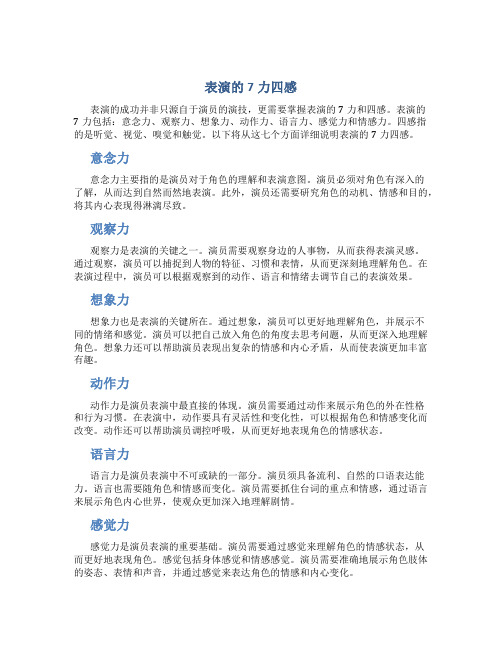
表演的7力四感表演的成功并非只源自于演员的演技,更需要掌握表演的7力和四感。
表演的7力包括:意念力、观察力、想象力、动作力、语言力、感觉力和情感力。
四感指的是听觉、视觉、嗅觉和触觉。
以下将从这七个方面详细说明表演的7力四感。
意念力意念力主要指的是演员对于角色的理解和表演意图。
演员必须对角色有深入的了解,从而达到自然而然地表演。
此外,演员还需要研究角色的动机、情感和目的,将其内心表现得淋漓尽致。
观察力观察力是表演的关键之一。
演员需要观察身边的人事物,从而获得表演灵感。
通过观察,演员可以捕捉到人物的特征、习惯和表情,从而更深刻地理解角色。
在表演过程中,演员可以根据观察到的动作、语言和情绪去调节自己的表演效果。
想象力想象力也是表演的关键所在。
通过想象,演员可以更好地理解角色,并展示不同的情绪和感觉。
演员可以把自己放入角色的角度去思考问题,从而更深入地理解角色。
想象力还可以帮助演员表现出复杂的情感和内心矛盾,从而使表演更加丰富有趣。
动作力动作力是演员表演中最直接的体现。
演员需要通过动作来展示角色的外在性格和行为习惯。
在表演中,动作要具有灵活性和变化性,可以根据角色和情感变化而改变。
动作还可以帮助演员调控呼吸,从而更好地表现角色的情感状态。
语言力语言力是演员表演中不可或缺的一部分。
演员须具备流利、自然的口语表达能力。
语言也需要随角色和情感而变化。
演员需要抓住台词的重点和情感,通过语言来展示角色内心世界,使观众更加深入地理解剧情。
感觉力感觉力是演员表演的重要基础。
演员需要通过感觉来理解角色的情感状态,从而更好地表现角色。
感觉包括身体感觉和情感感觉。
演员需要准确地展示角色肢体的姿态、表情和声音,并通过感觉来表达角色的情感和内心变化。
情感力情感力是演员表演的灵魂所在。
演员需要抓住角色的情感状态,展示角色的复杂情感和心理变化。
情感力需要通过前面介绍的意念力、观察力、想象力、动作力、语言力和感觉力来支持。
演员需要通过情感力让观众更好地理解角色、感受角色和更好地理解故事情节。
洪派四要素简谈

搬, 而是从剧本上进行了改写, 唱腔和 四要有观众群。 如果说我这个论点是正 表演都做了脱胎换骨的再创造, 形成了 确的, 那么洪影作为评剧“ 洪派” 创始人, 一个全新的《 刘伶醉酒》在演出中与另 ,
是名副其实的。
外三出折子戏组成一台。先是安排在
一、 代表剧 目
早在 1952 年,洪影改行步人评剧 行列, 就成功演出了由陈效影根据越剧 ( 梁山伯与祝英台》 和川剧《 柳荫记》 改 编的评剧《 柳荫记》 这出戏可称其为开 。 山之作, 它不仅反映了改编者动笔之初 就有要改变评剧“ 半台戏” 的远见卓识, 而且洪影敢于站在高起点迎难而上, 因
例略做说明。 开头一句原来只是压缩成
54
第五届 中国评剧艺术节
四 板的传统“ 二六”而洪影的这句用三 ,
板唱了“ 来了刘伶好酒的” 七个字, 下面 一个“ 字唱了四板充满豪气的甩腔。 男” 她用一板清角音出字, 然后旋律循环上 行, 经过一个小停顿, 闪板再起清角音 逐级进下行落在宫音。 这个先声夺人的 开句有四妙: 其一, 清晰地展现了是个
收、 强与弱、 字与腔 、 腔与情的完美结
合。其四, 妙在最后一段垛板转“ 二六” 前的“ 酒篓” 二字的高度夸张, 似说似 唱, 唱说难分, 狂” 可谓“ 到极限。 从这段 唱腔中, 完全可以感受到洪影是如何对 待唱戏中的“ 字的。我听过“ 唱” 有音无 乐” 的演唱, 我也听过“ 有乐无戏” 的演 唱, 而洪影则是一位有音有乐又有戏的 真正表演艺术家。
得者。在此, 就我最熟悉的两位洪影弟 子孙振宇和张俊玲, 谈谈洪派传人的成
就和实力。
这两位弟子一男一女, 都是中国剧 协会员、 国家一级演员。 孙振宇 1954 年 参加唐山地区评剧团,随即拜洪影为
“杂剧剧种”的演员需要具备哪些身体素质?
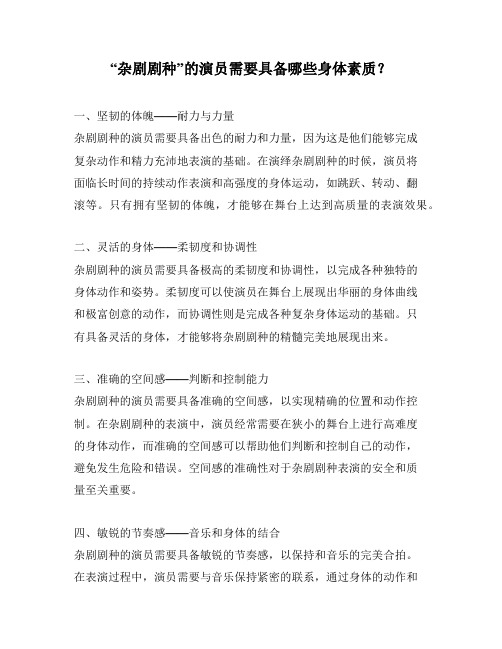
“杂剧剧种”的演员需要具备哪些身体素质?一、坚韧的体魄——耐力与力量杂剧剧种的演员需要具备出色的耐力和力量,因为这是他们能够完成复杂动作和精力充沛地表演的基础。
在演绎杂剧剧种的时候,演员将面临长时间的持续动作表演和高强度的身体运动,如跳跃、转动、翻滚等。
只有拥有坚韧的体魄,才能够在舞台上达到高质量的表演效果。
二、灵活的身体——柔韧度和协调性杂剧剧种的演员需要具备极高的柔韧度和协调性,以完成各种独特的身体动作和姿势。
柔韧度可以使演员在舞台上展现出华丽的身体曲线和极富创意的动作,而协调性则是完成各种复杂身体运动的基础。
只有具备灵活的身体,才能够将杂剧剧种的精髓完美地展现出来。
三、准确的空间感——判断和控制能力杂剧剧种的演员需要具备准确的空间感,以实现精确的位置和动作控制。
在杂剧剧种的表演中,演员经常需要在狭小的舞台上进行高难度的身体动作,而准确的空间感可以帮助他们判断和控制自己的动作,避免发生危险和错误。
空间感的准确性对于杂剧剧种表演的安全和质量至关重要。
四、敏锐的节奏感——音乐和身体的结合杂剧剧种的演员需要具备敏锐的节奏感,以保持和音乐的完美合拍。
在表演过程中,演员需要与音乐保持紧密的联系,通过身体的动作和节奏来诠释音乐的韵律和情感。
只有具备敏锐的节奏感,演员才能够与音乐相互呼应,使表演更加生动有力。
通过对“杂剧剧种”的演员所需的身体素质进行了分析,我们可以看出这些素质在表演中起到了重要的作用。
演员需要具备坚韧的体魄、灵活的身体、准确的空间感和敏锐的节奏感,才能够完美地呈现杂剧剧种的魅力。
如果你对杂剧剧种感兴趣,不妨从这些身体素质着手,锻炼自己,体验这个独特的舞台艺术。
演员个人职业生涯规划

演员个人职业生涯规划一个成功的演员不仅需要才华和努力,还需要制定一份个人职业生涯规划,以指导自己在演艺界的发展道路。
本文将探讨演员个人职业生涯规划的重要性,并提供一些实用的建议。
一、明确目标在制定个人职业生涯规划之前,演员需要明确自己的目标。
是成为一名舞台剧演员,还是希望在电影或电视剧中展现自己的才艺?想要成为知名演员还是更偏向于独立艺术家道路?明确目标有助于演员选择适合自己的发展路径,并制定相应的计划。
二、学习与培养技能演技是演员最基本的素质,因此,持续的学习和培养技能是必不可少的。
参加正规的表演培训班、学习表演技巧和表达能力,可以提高自己的演技水平。
此外,学习音乐、舞蹈、戏剧等相关艺术形式,也有助于演员全面发展和增加角色的多样性。
三、建立人脉在演艺圈,人脉的重要性不可忽视。
演员应该主动参加各类演出活动、戏剧节以及相关社交活动,通过与行业内的人建立联系和交流,提升知名度和机会。
此外,通过加入演员工会、参加演员讲座等活动,也可以结识更多的同行并获取更多的资源。
四、接受挑战个人职业生涯规划中应包含接受各种挑战的计划。
演员可以主动寻找不同类型的角色扮演机会,挑战不同的表演风格和个性特点。
不断尝试新的角色,可以让自己的演技得到锻炼和提高,同时也能够展示自己的多面性。
五、注重形象和品牌塑造在大众的眼中,演员的形象和品牌非常重要。
建议演员在职业生涯规划中注重形象和品牌的塑造。
通过精心选择和打造个人形象,同时维护公众形象的一致性,有助于演员树立自己独特的品牌形象。
此外,还应积极参与公益活动,展现自己对社会责任的承担,增加公众对演员的认可度。
六、持续自我评估和调整演员的职业生涯规划并非一成不变,需要根据行业的发展和个人的成长做出调整。
演员可以定期对自己的职业生涯计划进行评估,查看是否需要针对性地调整自己的方向和目标。
同时,要保持对行业发展的敏感性,时刻更新自己的知识和视野。
七、持久的耐心和毅力演员的职业生涯往往是一条漫长而曲折的道路,在面临挫折和困难时,持久的耐心和毅力是必不可少的品质。
话剧知识培训

3. 综合性。话剧是一种综合性的艺术,其特点是与在舞台塑造 具体艺术形象、向观众直接展现社会生活情景的需要和适应的。
4. 对话性。话剧区别于其他剧种的特点是通过大量的舞台对话 战线剧情、塑造人物和表达主题的。其中有人物独白,有观众 对话,在特定的时、空内完成戏剧内容。
幕、配音等效果 ⑦ 参与组织剧演的宣传工作和维持剧演前、中、后现
场秩序
如何做好剧社的一员
先要有个“在其位谋其政”的责任心,坦诚做人,认 真做事; 要有一个学会合作的心态:懂得戏剧艺术一次性完成于 舞台的特点, 体现剧作的人物关系需要默契,表演交流 和适应需要配合,舞台体现的成果离不开共同合作…… 戏剧的完美体现需要每位参与者做好自身的每一项工 作.而且有意在每一项工作中培养团队意识,体会参与的 意义和乐趣.让大家树立只有集体和谐努力的合作,才有 戏剧创造共同的成功的观念.这是一个社团生存的条件, 也是一个集体成功的必须.
剧本的创作
u选材的一般要求
选择作者最熟悉、感受最深刻、认识最透彻,而又有 重要社会意义的题材。要选择当前为群众所关心的题 材。
u要选择符合戏剧规律的题材
①抓住人物,抓住主体 ②选择那些足以引起性格之间撞击的人物和事件,构 成戏剧冲突 ③根据以上规则所选取的材料必须适合舞台演出。
剧本的结构
一部较长的剧本,往往会由许多不同的段 落所组成,而在不同种类的戏剧中,会使 用不同的单位区分段落。在西方的戏剧中, 普遍使用“幕”(Act)作为大的单位,在 “幕”之下再区分成许多小的“景” (scene)。
传统相声的名词解释

传统相声的名词解释相声,作为中国独特的文化艺术形式,具有悠久的历史和深厚的文化内涵。
其特点是以对口语言为基础,通过演员的对话和动作来表现,以幽默、夸张和夸张为手法,旨在引发观众的笑声和思考。
本文将以传统相声的角度,对相声中常用的一些名词进行解释。
一、相声相声,起源于明朝,成熟于清朝,深受民众喜爱。
相声通过对话和情节的演绎,以生动的语言和夸张的动作,展现出社会人物的特征和社会现象的讽刺,将现实生活中的矛盾和笑料转化为欢乐的艺术形式,具有强烈的现实意义和人文关怀。
二、对口对口是相声中最为重要的表演形式之一。
对口是指演员之间的互动对话,要求演员有敏锐的反应能力和灵活的语言表达能力。
通过对口,演员可以互相追问、相互辩论、讨论问题等,使得台上的情节更加生动有趣,充满戏剧性和喜剧效果。
三、协作协作是相声中不可或缺的要素之一。
相声演员通过默契的配合和互动,共同创造出欢乐和谐的舞台效果。
协作要求演员之间的默契和配合,需要在对口过程中互相补充、互相呼应,使得双方之间的对话更加流畅、生动,并呈现出更丰富的戏剧冲突和喜剧效果。
四、幽默幽默是相声的核心元素之一。
相声中的幽默,往往通过夸张、夸大和对现实生活中的矛盾进行讽刺,表达出对社会现象的关注和思考。
幽默不仅需要演员具备搞笑的个人特质和表演技巧,更需要对生活有准确的洞察力和对社会问题有独到的见解,在形式上和内容上都能够引发观众的笑声和思考。
五、情节情节是相声故事中的重要组成部分。
相声的情节通常由故事的起承转合构成,通过情境、对话、动作等表现形式,将故事中的情节展示给观众。
情节在相声中起到串联各个段落的作用,要求演员在对台过程中通过情节的展开和转折,使得故事更具有戏剧性和连贯性,激发观众的共鸣和情感回应。
六、讽刺讽刺是相声中常用的一种表演手法。
通过夸张和夸大的表现形式,演员对社会现象中的不足和问题进行刻画,用尖锐的语言和幽默的方式对其进行讽刺和批评。
讽刺在相声中不仅仅是对现实生活的“吐槽”,更是对社会问题的关注和思考,可以引发观众的共鸣和思考,使得相声具有丰富的艺术内涵和社会意义。
翁文千:戏剧课堂上的“领舞者”
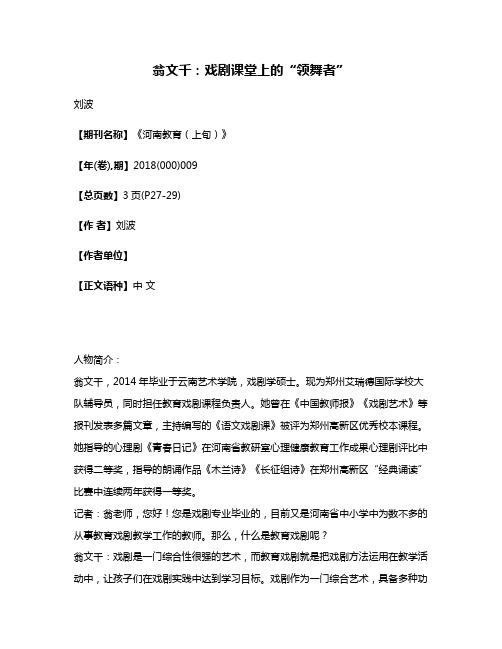
翁文千:戏剧课堂上的“领舞者”刘波【期刊名称】《河南教育(上旬)》【年(卷),期】2018(000)009【总页数】3页(P27-29)【作者】刘波【作者单位】【正文语种】中文人物简介:翁文千,2014年毕业于云南艺术学院,戏剧学硕士。
现为郑州艾瑞德国际学校大队辅导员,同时担任教育戏剧课程负责人。
她曾在《中国教师报》《戏剧艺术》等报刊发表多篇文章,主持编写的《语文戏剧课》被评为郑州高新区优秀校本课程。
她指导的心理剧《青春日记》在河南省教研室心理健康教育工作成果心理剧评比中获得二等奖,指导的朗诵作品《木兰诗》《长征组诗》在郑州高新区“经典诵读”比赛中连续两年获得一等奖。
记者:翁老师,您好!您是戏剧专业毕业的,目前又是河南省中小学中为数不多的从事教育戏剧教学工作的教师。
那么,什么是教育戏剧呢?翁文千:戏剧是一门综合性很强的艺术,而教育戏剧就是把戏剧方法运用在教学活动中,让孩子们在戏剧实践中达到学习目标。
戏剧作为一门综合艺术,具备多种功能,而教育戏剧突显的是戏剧艺术中的教育功能和教学功能。
孩子们在教室里进行戏剧的创作、编排、展示等学习活动,教师在这个过程中注重培养孩子的多项能力。
可以说,教育戏剧是以教育为目的、戏剧为方式的一门课程。
记者:既然是一门课程,那么这门课程主要培养学生哪些方面的能力呢?相较于其他学科,教育戏剧的课堂又有什么特点呢?翁文千:总的来说,教育戏剧是高感性思维的培养。
高感性人群善于观察趋势和机会,能够细致捕捉人与人之间最微妙的情感,从而创编引人入胜的故事,将看似不相干的概念相结合,进而产生新事物。
在戏剧专业中有一个专业名词,叫作“七力四感”,教育戏剧课程中会对每个孩子的“七力四感”进行训练。
“七力”是指细致的观察力、稳定的注意力、丰富的想象力、敏锐的感受力、准确的思考力、灵敏的适应力、鲜明的肢体与语言表现力,“四感”是指真实感、形象感、幽默感、节奏感。
训练“七力四感”,是培养高感性思维的一种好方式。
- 1、下载文档前请自行甄别文档内容的完整性,平台不提供额外的编辑、内容补充、找答案等附加服务。
- 2、"仅部分预览"的文档,不可在线预览部分如存在完整性等问题,可反馈申请退款(可完整预览的文档不适用该条件!)。
- 3、如文档侵犯您的权益,请联系客服反馈,我们会尽快为您处理(人工客服工作时间:9:00-18:30)。
演员在进行创作的时候,必须具有积极、稳定和不断持续发展着的注意力。在生活中,人们或者是自觉地去注意某一对象,或者是不自觉地被某一对象把注意力吸引过去。实际上人们总是非常自然地注意着身边发生的一切事情,把注意力集中在他们所应该集中的地方。然而当演员进行表演创作时,情况就不一样了。在演员进行表演创作时,他(她)是在观众面前当众表演,对面坐着的是双眼注视着他(她)的观众,他们往往更能够左右演员的注意力。这些因素的干扰,再加上演员个人生活中的某种原因,如演员的私心杂念,或者是由于演员遇上了什么不愉快的事情,往往都会使演员难以把注意力集中在
表演创作上,因此,也就必然会影响演员的创作。演员的注意力不能集中在自己的创作上,首先表现在他(她)不能把注意力集中在行动的对象上,不能真正地在舞台上行动起来,因而也就不可能在行动中去感受并且真正地与对手进行真实的相互交流,这样就必然使表演失去了真实性和有机性。在国内外的一些戏剧和电影学院的一年级教学中,有的教师甚至每次课都要抽出一个小时的时间来进行注意力集中的训练。由此可以看出,在表演创作中,积极而又稳定的注意力对于一个演员来说是十分重要的。
另一方面,演员的感受力的增强与演员的创作素质的全面发展也有着密切的联系。例如:创作中的注意力的养成,想像力、真诚的信念与真实感的养成,都会使感受力得到增强与发展。演员在创作中的感受力实际上是演员有机的创作天性中的一个组成部分,或者说是演员创作心理活动的链条中的一个环节。因此,演员必须注意在全面培养与发展自己的创作素质的过程中去发展自己的感受能力。
演员的这种观察力,是在演员有意识地、长期不懈地观察生活的努力中培养起来的。它要求演员时时刻刻都应该是目中有人,把目光总是投向生活中千差万别、风采各异的人群。有的演员往往不能做到这一点,他们目中无人,总是想着炫耀自己,结果在与人们接触时,不仅不能观察别人,反而成为人们观察与议论的对象。
2.积极而又稳定的注意力
们经常议论在表演中存在着虚假的弊病,而表演上的虚假主要是因为演员在创造人物时缺乏真实的体验。为什么有些演员不能够做到真实的体验呢?除了创作方法与技巧上的原因之外,很重要的一个原因就是缺乏演员所应该具备的敏锐而又真挚的感受力。
演员的创作任务是要创造出具有审美价值的人物形象,它不仅在演员的总体素质方面提出严格的要求,同时对于演员的创作素质也必然有着特殊的要求。另一方面,表演艺术的特点也对演员的创作素质提出了特殊的要求。表演要求演员最终“化身成角色”,这就使演员在作中既是创作者,又是创作的材料与工具,同时又是创作出来的艺术品———人物形象。此外,演员又都是在假定的、艺术虚构的情境中去进行创作。这些特点都必然会要求演员在创作中具有一些特殊的能力以适应创作的需要。
动地想像出人物特有的心理———形体动作,即在人物的内心动作的欲求推动下心理活动的过程以及体现出这种心理活动过程的形体与语言动作。只有这种充满强烈的动作性的想像,演员才能促使自己在表演时行动起来。
此外,演员的想像中还应该有一种在创作过程中出现的即兴想像。如果演员不想在每次的创作中去机械地重复前一次的创作,就需要他(她)在与同演者进行合作时,在接受对手所给予刺激的同时,能够出现一种即兴的想像,进一步丰富和改进自 己的创作,使每一次创作都更为生动。
5准确而又合理的判断与思考力
在表演艺术创作中,演员创作心理活动的链条上的另一个重要环节就是判断。判断,在相当大的程度上就是思考,所以演员是否具有判断力,从某种意义上说,就是演员在表演时是否具有思考的能力。
致入微地捕捉人物形象的外部特征和了解、感受所观察人物的心理特征的能力。
表演艺术是表现人的艺术。演员的生活积累不能不把焦点集中在对人的观察和研究上。当然,由于人总是和他(她)所处的时代、社会密不可分地联系在一起,所以演员不可避免地要在观察和研究人的同时去研究与分析时代和社会,特别是它们对于人的影响,进而逐步深入到人的内心深处,了解与体验不同人的思想、欲望、情感等等。只有这样,演员在运用这些生活素材进行创作时,才有可能真正地创造出“人的精神生活”来。但这并不是说对人物的外部特征的观察是无足轻重的。恰恰相反,由于人的内心世界是不可见的,所以对于人的内心世界的了解往往是由表及里,由外到内。人的音容笑貌、穿着打扮、言谈举止、行为方式都是人的内心世界的反映,因此对于人的外部特征的观察、了解,可以说是通向人的内心世界的桥梁,同时又是演员在创作一个内外部统一的人物形象时所不可缺少的组成部分。
演员创作素质中感受力的培养与演员的总体素质有着一定的联系。一般来说,生活中真诚、热情,对生活充满热爱,有着鲜明爱憎的人,在创作中的感受力比起那些虚伪、冷漠,对生活毫无热情,对于周围发生的事情无动于衷的人要强得多。在排演场上表现冷漠的人,一般来说在生活中也往往是十分冷漠的人,这种人在创作中很难像于是之所说的那样“一点火就着”。因此,演员要想增强与发展自己的感受力,首先就应该在生活中努力使自己少一点虚伪,多一份真诚,永远对生活充满热情。
演员的想像自然还包括幻想在内,我国戏曲艺诀中有这样一句话:“世上有,戏上有;有的有,没有的也有。”除了反映现实生活的作品之外,还有大量的神话剧、童话剧和科幻剧等多种多样体裁的作品。在这些不同体裁的表演创作中,演员就要充分地发挥出丰富多彩的幻想来激发和推培养发展起来。演员的想像力(包括幻想力)的培养与发展是和演员的生活积累与文学、艺术修养分不开的。生活知识的广博与文艺修养的丰富是演员具有丰富、活跃的想像力的基础。“读万卷书,行万里路”,就会为自己的想像提供必要的素材。
4敏锐而又真挚的感受力
在生活中,人们接受外界事物的刺激时,总会产生某种感受并引发出相应的情绪上的变化,我们把这种能力称之为感受力。在表演艺术中,很重要的一个方面是要创造出人物的情绪体验,而演员的感受力则是创造出人物的情绪体验最主要的保证。由于在表演艺术创作中,演员所接受的并不是像生活中那样的真正的刺激,而是一种艺术的虚构,再加上创作环境中一些因素的干扰,有的演员往往感受不到客观上所给予的刺激,因而也就无法创造出人物的情绪体验。这样的演员在表演中不能真正地动心、动情,结果只能以虚假的“表演情绪”来搪塞。人
有人说,任何人都可以成为一个演员。这种观点在一定程度上有正确的一面,因为任何人,包括残疾人在内,都具有可能成为一个演员的最基本的条件。在戏剧演出中,特别是在电影与电视剧的创作中,都曾经有业余演员参与,而且有的业余演员也曾创造出十分光彩的人物形象。但是,这绝不意味着成为一个专业的演员无需具备从事表演艺术这一专业所特有的素质。恰恰相反,对于一个演员在专业素质上的要求,比对从事任何其他职业的人的要求要严格得多。或者可以说,一个不具备演员应有的创作素质的人,是不可能从事表演艺术的创造的。
演员在创作中的注意是一种有意识的注意。也就是说在创作中应该把自己的注意力积极、稳定地集中在行动的对象上,并且随着行动的发展而持续不断地发展下去。这种注意力的最基本的要求就是演员在创作中应该能够做到真听、真看、真感觉。一个具有良好的创作素质的演员,应该在他(她)进行创作时十分迅速地把注意力集中到创作上来,并且下意识地做到真听、真看、真感觉。而要做到这一点,演员除了在创作中尽可能地克服自己思想上的私心杂念之外,最重要的是“醉心”于戏剧情境中的事物,善于为自己表演中的行动创造出诱人的目的。抓住了这一关键,演员在培养与发展自身素质时,就要从强制自己在创作的环境中做到真听、真看、真感觉开始,逐渐地使之成为演员本人创作天性的一部分。
演员在进行生活观察,特别是在观察人物时,有一个显著的特点,就是它和模仿紧密地联系在一起。也就是说,演员往往是通过模仿来把自己所观察的人物“速写”在自己身上,最终保留在自己的记忆中储存起来。但是,由于演员在模仿的时候不可能不加上自己的主观臆测与主观态度,所以模仿时就不完全是那个被模仿的对象本身了。从这个意义上说,应该是一种“模拟”。
演员所应具备的感受力是一种能够在艺术虚构的情境中感受客观事物刺激的能力。一个具有良好素质的演员,应该能够非常敏锐、非常真挚地去感受剧情所提供的事件、事实所产生的影响,布景和灯光所营造出来的气氛,表演对手的一举一动、只言片语甚至是一个微妙的眼神、一声轻轻的叹息等所给予的刺激,从而引发出相应的情绪体验。
除此之外,演员还应该主动地训练自己的想像力。实际上想像在某种意义上就是对自己所观察到的事物和过去的生活经历中所积累的经验进行重新组织与加工。例如:在观察生活的过程中,根据观察到的事物,根据自己的经验,发挥自己的想像,把观察到的人与事发展成为一个故事,而且在细节上尽可能的使之形象化、具体化。反复地进行这方面的锻炼,演员的想像力就可能得到增长。在表演创作的过程中,演员可以运用“有魔力的假使”,以它来调动起自己的想像,去补充和深化剧作者的提示,并且使想像按照应有的逻辑不间断地发展下去。
3丰富而又活跃的想像力
任何一种艺术创作都离不开想像,演员的创作自然也是如此。尽管演员是在剧作家创造出来的文学形象的基础上进行再创造,但是要想把剧本中的文学形象再创造成为人物形象,演员必须运用自己的想像把剧作者提供的情境、事件、人物等都变得具体和丰富起来,从而使剧本中简单的舞台提示、人物的动作和语言,都在演员的想像力的帮助下得到充实和深化。否则演员根本谈不上是一个创作者,顶多是剧作者的传声筒而已。所以,想像力就成为一个演员创作素质中不可缺少的部分,而且可以说是十分重要的部分。演员在表演创作中的想像,与其他艺术创作者的想像有共同的一面,这“首先就意味着用内心视觉去看到我们正在想像的东西”。对于演员来说,这种想像在创作中不仅起着对剧作的补充与深化的作用,还能够促使演员产生情绪体验以及动作的欲求。另一方面,演员的想像也有它自身的特点,那就是应该具有强烈的行动性。由于表演艺术创作的基础是行动,演员的想像就不能仅仅停留在静态的描绘上,尽管这种静态的描绘有时是非常必要的。他(她)更需要的是能够具体地、形象地、生
王淑琰教授认为,一般说来,要想成为一个称职的演员,最起码应该具有“七力”与“四感”
什么是“七力”?
1.敏锐而又细致的观察力
表演艺术创作不能离开生活这一源泉。因此,培养与发展自己观察生活的能力就是演员的一种最重要的基本功。在对生活的观察中,特别是对于人的观察尤为重要。因为表演艺术是表现人的艺术,演员在自己的生活积累中,焦点自然应该集中在对于生活中的人的观察上。一个演员要想在对生活的观察中有所收获,就必须具有敏锐而又细
